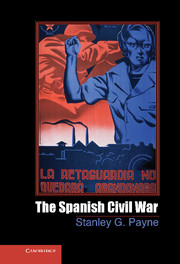Book contents
- Frontmatter
- Contents
- Chronology of Major Events
- Glossary
- Preface
- Introduction Civil War in Twentieth-Century Europe
- 1 Modernization and Conflict in Spain
- 2 From Revolutionary Insurrection to Popular Front
- 3 The Breakdown of Democracy
- 4 The Military Insurrection of the Eighteenth of July
- 5 The Battle of Madrid – the First Turning Point
- 6 Revolution
- 7 Terror
- 8 A War of Religion
- 9 Franco's Counterrevolution
- 10 Foreign Intervention and Nonintervention
- 11 Soviet Policy in Spain, 1936–1939
- 12 The Propaganda and Culture War
- 13 A Second Counterrevolution? The Power Struggle in the Republican Zone
- 14 The Decisive Northern Campaigns of 1937–1938
- 15 The War at Sea and in the Air
- 16 Civil Wars within a Civil War
- 17 The War in Perspective
- Conclusion Costs and Consequences
- Select Bibliography
- Index
- References
15 - The War at Sea and in the Air
Published online by Cambridge University Press: 05 September 2012
- Frontmatter
- Contents
- Chronology of Major Events
- Glossary
- Preface
- Introduction Civil War in Twentieth-Century Europe
- 1 Modernization and Conflict in Spain
- 2 From Revolutionary Insurrection to Popular Front
- 3 The Breakdown of Democracy
- 4 The Military Insurrection of the Eighteenth of July
- 5 The Battle of Madrid – the First Turning Point
- 6 Revolution
- 7 Terror
- 8 A War of Religion
- 9 Franco's Counterrevolution
- 10 Foreign Intervention and Nonintervention
- 11 Soviet Policy in Spain, 1936–1939
- 12 The Propaganda and Culture War
- 13 A Second Counterrevolution? The Power Struggle in the Republican Zone
- 14 The Decisive Northern Campaigns of 1937–1938
- 15 The War at Sea and in the Air
- 16 Civil Wars within a Civil War
- 17 The War in Perspective
- Conclusion Costs and Consequences
- Select Bibliography
- Index
- References
Summary
The Spanish civil war differed from all the other civil wars of the era in being fought at sea and in the air as well as on land. The only significant naval action in the Russian civil war had been the intervention of the British Royal Navy in 1919, which played a decisive role in the Baltic, helping guarantee the independence of the Baltic republics. Airplanes participated on both sides, but only to a minor degree, while later, during the Greek civil war of 1944–49, air power was exercised exclusively on behalf of the counterrevolutionary government forces and found only limited targets. The naval dimension was important throughout the Spanish conflict for two reasons: the first was the reliance by both sides on arms imports, and the second the geography of the peninsula, with its extremely long coastline, islands, and also the significant hinterland of the Nationalists in the Moroccan Protectorate.
In organizing the revolt, Mola failed to take adequate measures to ensure full participation of the navy. Historically, Spanish naval officers had eschewed political activism, although in general they came from higher social stratae and tended to be more rightist in political attitudes than army men. Mola failed to take into account that ordinary sailors had a higher level of political consciousness than common soldiers and, perhaps owing in part to the close quarters in which they lived, tended to be more capable of collective action. Thus when naval officers tried to bring their ships into support of the insurgency, they often faced mutiny – something rare in the army.
- Type
- Chapter
- Information
- The Spanish Civil War , pp. 203 - 215Publisher: Cambridge University PressPrint publication year: 2012



